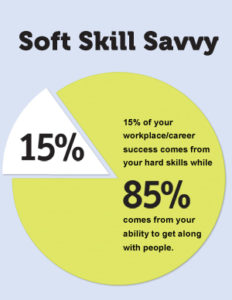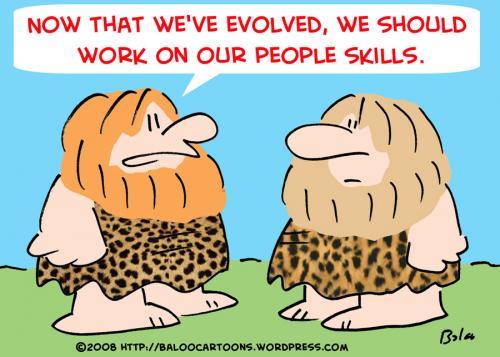As your career progresses, hard skills – technical, tangible, and teachable skills – allow you to perform your job, keep you up to snuff. While those things are crucial to your professional success, it’s imperative that you don’t ignore your “soft” skills. Soft skills, sometimes called “people skills’ or “interpersonal skills”, are intangible qualities that determine how you manage your own behavior, as well as interact with and get along with others. They are just as important when it comes to job prospects and advancements.
Having good soft skills maximize the benefits of hard skills and the effective human interaction to everyone’s benefit. Lynn Taylor, a national workplace expert and author of Tame Your Terrible Office Tyrant; How to Manage Childish Boss Behavior and Thrive in Your Job says, “People want to connect on a humane level in the office; the alternative is a sterile environment with low productivity. So, the more you demonstrate these abilities, the faster your career will advance. It’s the ‘office diplomats’ with strong emotional intelligence who are most likely to be strong, effective corporate leaders. They realize that trusting relationships built on diplomacy and respect are at the heart of both individual success and corporate productivity. An ounce of people sensitivity is worth a pound of cure when it comes to daily human interaction and mitigating conflict. By developing these soft skills, you’ll reduce bad behavior in the office, and your positive approach will be contagious.”

Here are some soft skills and attributes you’ll need to succeed at work:
- Strong Communication Skills. The most fundamental people skill. It encompasses your persona and ability to get along with your colleagues, persuade others to listen to your ideas, and much more. “If you have a gift for the spoken and written word, you will always put your best foot forward. Being articulate is highly prized in today’s workplace, when time is at a premium and technology requires constant communication.” says Taylor.
- Non-verbal communication skills. Non-verbal communication is something that other people notice whether you are aware of your actions or not. Your body language is constantly speaking. Everything that you do or don’t do says something about you, as a person, and how you are feeling. Your facial expressions (such as eye contact, posture, your voice and even the way you position yourself physically in a room or amongst colleagues is constantly revealing your true attitude, for better or worse. Those who can communicate non-verbally can almost subliminally reinforce what they are saying verbally.
- Active Listening Skills. Hearing someone and actively listening to them are two different things. When most people hear someone speak, they start forming a response in their mind (or worse, start blurting their own opinions) before the other person finishes what they’re saying. Active listening means you listen without interruption and then take time to think and form a response before replying. It takes a lot of practice but produces better results.
- Questioning. Questioning is something that often builds upon listening, but it is not merely a device for obtaining information. It is an excellent way to initiate a conversation and keep it going. It demonstrates interest and can instantaneously draw someone into your desire to listen. Smart questions show that you know how to approach people and problems and how to get the answers you need.
- Genuine interest in others. People know when you’re really interested in them. If you’re not showing a genuine interest – asking thoughtful questions and considering about their answers – your interaction can actually have an opposite effect to the one intended. Make an effort to remember names, dates and important life events.
- A sense of humor. Humor often comes with a bite. It’s about poking fun or making light of things that matter to people, and this inherent edge can easily lead to conflict. On top of that, some leaders associate humor with a lack of dedication or seriousness about work. However, these fears surrounding humor in the workplace are not only unfounded. “Nobody ever died of laughter”, it was once said. Who does not enjoy a little laughter? It’s a great diffuser of tension and conflict. A growing body of research suggests that workplace humor is paramount to productivity, cohesion and creativity.
- Manners. Good manners pave way for many other interpersonal skills to come naturally. With business becoming increasingly more global, even for small businesses, manners are more important than ever. A basic understanding of etiquette translates to other cultures and their expectations. Using ‘please’ and ‘thank you’ goes a long way. We are all guilty of assuming people are less intelligent if they have sub-par manners. This same judgment is reflected back on us by the people we interact with. Anyone who has visited other countries knows how sensitive its residents are to visitors’ manners. Business-to-business interactions function in much the same way.
- Open-mindedness. In order to create trust and respect in others, people need to know that their point of view and feedback will be taken into consideration. Being known as someone who keeps an open mind also make you approachable and easier to work with.
- Proactive Problem Solving. A rare day would be one without problems. What makes this a skill is not necessarily how quickly you can solve a problem, but how you go about doing it. No plan is a guaranteed success, so there is always an element of risk. Some people can weigh risk better than others.The key aspects of successful problem solving are being able to identify exactly what the problem is, dissecting the problem so that it is fully understood, examining all options pertaining to solutions, setting up a system of strategies and objectives to solve the problem, and finally putting this plan into effect and monitoring its progress.
- Responsibility and Accountability. Responsibility and accountability are two reliable indicators of maturity. Saying you are going to do something and then actually doing it is a sign of responsibility. This builds trust between yourself and those they rely on you and it encourages others to seek your counsel and assistance. Holding yourself accountable for your actions is one of the most difficult things to do, both professionally and personally. This is also a crucial element of conflict management. When conflicts arise between yourself and others, or when you have made a mistake or at fault that is when accountability becomes difficult. Admitting to your mistakes isn’t enough. You have to understand the situation fully and respond in a way that addresses the issue comprehensively.
- The Art of Persuasion. There’s a good chance that some point in your career, you’ll have to sell others your ideas, products and services. Whether you’re up for a promotion, pitching a project or selling your services, you need to be able to form a strong, convincing argument for why you, and/or your products, are the “right” one.
- Negotiation Skills. Good negotiating skills are beneficial with both internal and external discussions. Internally, job offers and salary discussions greatly benefit from solid negotiating, as well as when it’s time to pitch a new idea or sway coworkers to your way of thinking. Externally, both vendors and customers often require negotiations and you can really become the hero when you are successful in either scenario.
- Self-management. Not all interpersonal skills are extroverted. Self-management refers to a combination of behaviors that focus on how people manage themselves in their work and life. It allows us to control our emotions when they are not aligned with what would be considered appropriate behavior for a given situation. This means controlling anger, hiding frustration, exuding calmness, etc. undoubtedly, there are times to show your true colors, but remaining composed is almost always the desired course of action. In addition, learning to manage your commitments, cultivating the motivation and capability to learn new things in support of your work and building & nurturing your personal network will make you successful.
- Ability to be supportive and motivate others. People want to be believed in, regardless of how successful they might be. By showing support in the form of encouragement, you can put someone back on track or keep them in the right direction. Be motivational around your boss and colleagues. You need to be accessible and upbeat. People at all levels want to be around enthusiastic people with drive and high energy.
A Beautiful Whole
Having a well-balanced repertoire of soft skills will allow you to handle any situation more gracefully. Nobody is perfect and learning these skills will forever be a work in progress. We spend years mastering on our hard skills. We should spend a comparable amount of time proactively improving our soft skills.
We will soon come with ways to help you develop soft skills. Till then, hope you make conscious efforts into improving your people skills and improve your and your colleagues’ career and be a valuable asset to your workplace.



One Reply to “Soft Skills: Stepping Stones to a Successful Career”
Comments are closed.